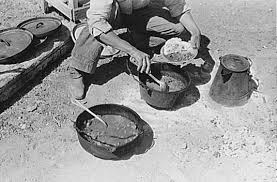CookingWithAltitude
19 09, 15 10:25 Filed under: MorningMissive

The thin air affects cooking as much as it affects the cook, and equally mysteriously. Water boils at a lower temperature which means that food takes longer to cook. How much longer depends upon some quadratic equation nobody can solve in their head. Like with all cooking, success remains a matter of feel. Those who lived their early years below a thousand feet developed a feel for cooking that seems wholly unsuited to altitude.
Moving here seems like being sent back to Go without my two hundred dollars whenever I enter the kitchen. The kitchen in our last place sat at seventy-one hundred feet below our present one, and I could cook almost anything without much deliberation. I received full value for my three hundred degree oven setting. Here, I get a steep discount. I naively thought perhaps an extra ounce of patience might compensate, but it does not reliably counterbalance. I’ve lost my nose, my feel for the craft, rendering my formerly considerable skills, abilities, and experience into rookie-class poking in the dark.
The learned journals are little help. Some assert linear adaptations which work about as well as rounding off Pi. I can heat the griddle to what registers as five fifty and still fail to achieve sear. Three more minutes added to my usual seven minute linguini boil does not as reliably produce al dente as it did nearer sea level. Beans, my life-long love, have utterly forsaken me, and threaten to ask me to become a chemist to compensate. I am not now nor am I ever likely to become a chemist, so this presents a dilemma.
I realize that I am about as well-equipped to comprehend the high altitude cooking calculus as I was to actually do calculus, and I could plead the same root cause. My calculus professor suggested that I was missing some fundamental understanding to successfully calculate in calculus, and I guess that might be the cause of my sudden inability to cook at altitude. My nose developed under another regime, over a very long, mostly unconscious period of time. Now, I possess much less time and I find myself painfully aware. I feel suddenly Sisyphus-like, anticipating a very long and ultimately unfruitful uphill climb. This sense says nothing about how long or how fruitful that climb might be, but it does cast a pall over what used to be one of my great joys in life.
I labeled my feeble attempts at calculus Cowboy Calculus. My professor was not amused, since my nose produced to his mind unbelievable results. On reflection, though, I realize that I employ a kind of Cowboy Calculus to everything I do. The instruction manual might explain how everyone else does it, but it never comes close to touching how I do stuff. Maybe this questionable ability comes from me teaching myself to read. I over time became aware that I seem to read differently than other people do. I employ a Cowboy Calculus there, too. With iteration, I suppose I could produce the right answers using my Cowboy Calculus, like my grandfather learned to calculate carpentry angles with his third grade education. Not everything operates according to Hoyle. I suspect that little actually does, which might deeply disturb Hoyle and delight the rest of us.
No better way to blunt enthusiasm than with conscious engagement. The joy for me comes from the unfettered immersion not from the slavish testing and assessment or mind-numbing instruction-following. I will have to discover my own felt sense for myself. I will have to molt considerable prior learning, unlearning quite a bit, and probably become more careful. Flatland cooking forgives almost every infraction. Altitude cooking indicts with the smallest sin but refuses to disclose the nature of the crime. It feels like a kangaroo court presided over by big mean guys lacking even the most modest generosity. Their verdicts seem arbitrary but nonetheless final.
I find I can with little risk consume all the fresh food I want at altitude, and so far, fresh food abounds. Two large bowls filled with peaches and tomatoes and lord knows what-all grace the kitchen table, but the season wanes. Soon, the weather will turn. Soups, stews, and roasts will predominate, and these seem altitude-sensitive. I have pulled out the old pressure cooker and washed out all the quart mason jars, more than half of which already hold suspended summer for later emergency use. I anticipate gummy pastas and mushy rice, grainy beans and half-baked parsnips, and I pray for forgiveness beforehand. The judge I most fear, though, lives inside me. I can too easily shrink from my upcoming learning, shirk my rightful kitchen duties and whimper off into eternal apprenticeship, a place I do not wish to go.
I expect to be whining, sometimes publicly but hopefully more often to myself, for I have always been a noisy learner. I hope to suffer in relative silence, but suffer I will as I learn to trust my nose again and as my nose becomes more trustworthy over time. I have the theory but not the practice, for practice can’t be crammed into either a book or any compressed amount of time. This first winter at altitude will find me struggling. By Spring, I might have found my Cowboy Cooking Calculus again.
©2015 by David A. Schmaltz - all rights reserved
blog comments powered by Disqus


